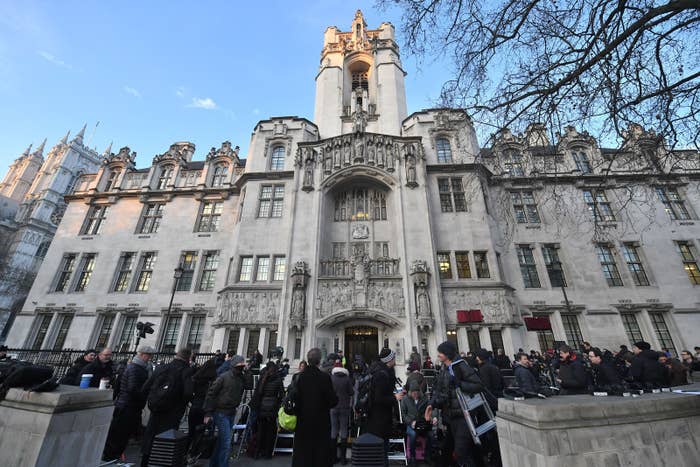
Nicola Sturgeon has warned that Scotland's future is "better in our own hands" after the UK's highest court ruled the Scottish parliament does not have the power to veto the decision to leave the European Union.
On Tuesday morning, the Supreme Court in London ruled that the UK government must consult the Westminster parliament before triggering Article 50 and beginning the official two-year process of leaving the EU.
Within the judgment was a further ruling that the parliament in Scotland, where 62% of people voted to remain inside the EU in June's referendum, does not hold sufficient power to legally prevent the UK's withdrawal from the EU.
First minister Sturgeon said the ruling showed that it was becoming "clearer by the day" that Scotland was not being listened to on Brexit, and said the foundations of devolution throughout the UK are being "shown to be worthless".
Scottish Conservative leader Ruth Davidson said Sturgeon had tried and "comprehensively failed" to hold the rest of the UK to "ransom", and urged the first minister to help the UK government get the best Brexit deal possible.
Scotland's most senior lawyer, the lord advocate, argued during the case in December that convention dictates the Scottish parliament would "normally" be consulted on changes to its laws. The Supreme Court ruled that this convention – known as the Sewel convention – is not legally enforceable.
The ruling stated: "The Lord Advocate and the Counsel General for Wales were correct to acknowledge that the Scottish parliament and the Welsh Assembly did not have a legal veto on the United Kingdom’s withdrawal from the European Union. Nor in our view has the Northern Ireland Assembly."

The judges went on to explain: "As to the application of the Sewel convention to the decision to withdraw from the EU given the effect on the devolved competences, the convention operates as a political constraint on the activity of the UK parliament. It therefore plays an important role in the operation of the UK constitution.
"But the policing of its scope and operation is not within the constitutional remit of the courts. The devolved legislatures do not have a veto on the UK’s decision to withdraw from the EU."
Sturgeon said the Scottish government was "disappointed" by the decision of the Supreme Court when it came to consent from Holyrood, but pledged that she would ask the Scottish parliament for its consent regardless.
"It is becoming clearer by the day that Scotland's voice is simply not being heard or listened to within the UK," said Sturgeon.
"The claims about Scotland being an equal partner are being exposed as nothing more than empty rhetoric and the very foundations of the devolution settlement that are supposed to protect our interests – such as the statutory embedding of the Sewel convention – are being shown to be worthless.
“This raises fundamental issues above and beyond that of EU membership. Is Scotland content for our future to be dictated by an increasingly right-wing Westminster government with just one MP here – or is it better that we take our future into our own hands?"
The first minister added: "It is becoming ever clearer that this is a choice that Scotland must make.”

However, Davidson urged the SNP government to "get behind the UK" and help Theresa May get the best deal for the "whole of the UK", rather than seeking to "manufacture a case for separation".
“All parties should now respect the ruling that the court has given," said Davidson. "Yet typically, Nicola Sturgeon has decided to ignore it by stating – even before the verdict was in – that she would still seek a separate vote at Holyrood.
“The Scottish Conservatives will have no truck with yet more SNP stunts on Brexit. Whatever side people were on last year, Scotland wants to get on with the negotiations so we can start to leave the uncertainty of the last few years behind us.
“We have all had enough of the nationalists using every diversionary tactic they can to try to use Brexit to manufacture a case for separation. The SNP needs to decide: Does it want Britain's renegotiation to succeed or fail?"
She added: “If it is the former, it needs to end the attempts to sow division and add to the uncertainty we face, and instead get behind the UK attempt to get the right deal for the whole UK."
Following the judgment, the SNP pledged to table 50 amendments to the bill that will have to be introduced to parliament when it's consulted over the triggering of Article 50.
